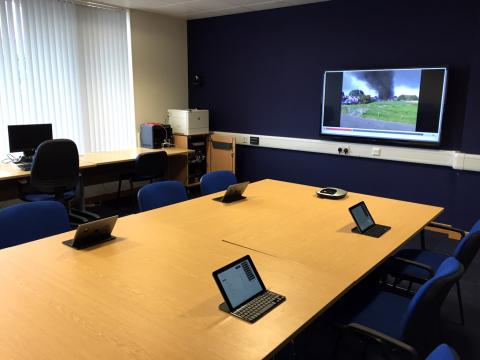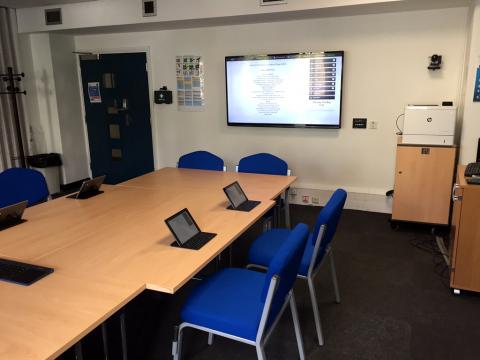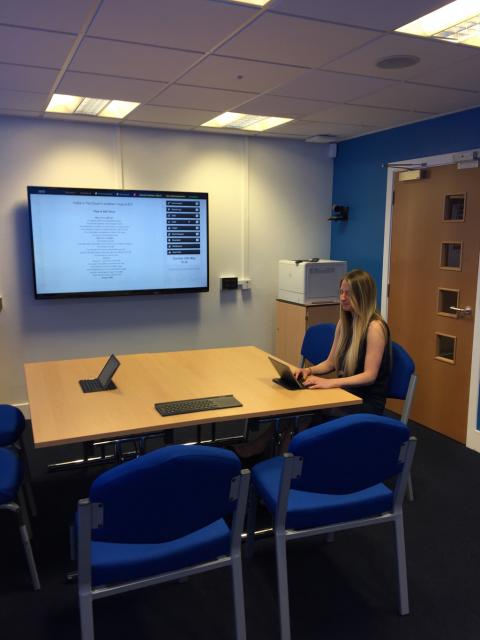Hydra Foundation Blog
You are viewing 4 posts by the author Geoff Williams
Canterbury Christ Church Uni Social Worker's Exercises
The Hydra Foundation have been assisting lecturers at Canterbury Christ Church University (CCCU) with the delivery of three exercises for BA and MA Social Work students. The exercises take the students through a number of very different case studies and look at time and case load management, critical incident decision making and risk assessments.
Feedback from the students has been incredibly positive and we look forward to delivering further exercises with the team at CCCU.
BTP run simultaneous dual site HITC exercise
The 17th May 2016 saw the culmination of over 10 years thinking and planning: The delivery of a multi-site Hydra exercise. Over a decade ago, the Hydra Foundation identified an educational requirement to run a Hydra event involving multiple syndicates located across different sites, and to meet that immediate need, we re-worked the existing technology of the time, to deliver on the concept. Although it worked, it was not perfect and required a high degree of technical knowledge. One of the key features that we wanted to include in the new Hydra in the Cloud system was the ability to quickly and easily bring in syndicates from other locations using Hydra and standard internet technologies.
The British Transport Police (BTP) ran a HITC event from their suite in London. This site provided the control room, plenary and two syndicate rooms. The newly upgraded Liverpool BTP HITC suite housed another syndicate. Through HITC and video conferencing, the Liverpool syndicate was able to take part as a full syndicate during the both syndicate and plenary sessions. They could see and hear the plenary and take part in discussions with other syndicates during those de-briefs and similarly, the London based syndicates and facilitators could fully interact with them. HITC handles multi-site syndicates seamlessly, allowing users to log in with the appropriate credentials and run a syndicate for their exercise anywhere that has an internet connected machine and accompanying HITC technologies. Although a minimal infrastructure is required at the remote location, there does need to be a central Hydra hub.
The trailblazing BTP have shown the way for UK policing and their use of HITC, with remote syndicate room locations now in Birmingham, Cardiff and Glasgow, allowing them to continue in their evolution as a National force. We have long dreamed of running a multiple country CT type exercise over an extended period, perhaps beginning in Australia, moving to the USA and finishing in Britain. This exciting new development will allow that dream to become reality.
The revolutionary new capabilities are available to all HITC suites but please speak with the Hydra Foundation first to enable us to support you, your facilitators and other Hydra staff in understanding the technology and learning some new skills in exercise delivery and design.
The flexibility, enhancements to new and existing exercises and of course, cost savings are immense. All of the following examples apply to both the UK and internationally. Some of the obvious uses are:
You can run other syndicates from remote locations
You can bring in subject matter expertise and community representation for 'just in time' engagement to greatly enhance the immersion and knowledge gained, without requiring the presence of the people for the entire day.
Other agencies can be brought into an exercise as syndicates for all or part of the event
Links to academia can be greatly enhanced by involving them in exercises and research opportunities.
There are probably many other ideas the creative and industrious members of the Hydra community are already considering.
Please get involved in the conversation.
Sellafield Workshop
On 23rd March 2016, the Hydra Foundation ran a workshop with 35 senior managers from the Sellafield Nuclear Power Station. The purpose of the workshop was to assemble from a broad Sellafield leadership constituency, a current in-depth strategic picture of the challenges confronting Sellafield in managing potential incidents and their potential consequences. The workshop was designed to identify whether Hydra and 10,000 volts events would meet their future needs.
The workshop commenced with a presentation by Professor Crego on Critical Incident decision making and an explanation of both the 10,000 volts and Hydra methodologies. The delegates then answered the question: ‘What matters?’ in relation to dealing with critical incidents and safety at their site. The exact content of their responses are of course sensitive and cannot be published here but they indicated a genuine understanding of the complexities involved and a real desire to keep both their own people and the public safe.
The delegates then moved on to identifying some potential scenarios that could be generated and delivered through the Hydra system. Throughout the sessions, the delegates demonstrated remarkable scientific and technical acumen and a mature and self-critical approach to the issues highlighted. They also demonstrated a willingness to engage in the development of training activities that would make a real difference.
The content that was produced throughout the 10,000 volt workshop showed an absolute synergy between what the managers at Sellafield have identified as their training needs and what the Hydra Foundation delivers in terms of complex, critical incident training in a highly immersive environment.
Canterbury Tales
Wow… four days and four exercises at Christchurch Canterbury University (CCCU).
On 14th to 17th March the Hydra Foundation and senior staff from School of Law & Criminal Justice and Computing ran an existing exercise twice and launched two exciting new exercises.
Although Foundation staff were on hand to assist and to add a few recommendations here and there to keep the exercises on song, every credit to the facilitators from the university who in a high pressure environment engaged their students in making difficult decisions and producing some exquisite rationale.
Monday 14th March saw the launch of the new Crime Scene Managers exercise, ‘Icarus’. With a dead body, some blood and gore to add the necessary reality, the students were quickly immersed in the exercise which was well received by all concerned.
Tuesday and Wednesday saw two separate deliveries of the existing Terrorism exercise, ‘Veritas’ which was first successfully launched in March 2015. This exercise was again well received by the student delegates and represents the blueprint of meeting the challenges of running HYDRA exercises in a university environment where practical skills and knowledge are not yet at an expert level.
Thursday saw the launch of the Cyber Crime exercise, ‘Cloister’. Only a small number of delegates attended this event and those that did were 2nd year students and not as in the previous exercises 3rd year students. This presented an additional challenge due to the theoretical knowledge base of the delegates being somewhat limited. The day however was adapted by Professor Jonathan Crego who ran the exercise in a plenary environment. The students were still tasked within the exercise and were quickly engaged with the emerging problems and the demand for making difficult decisions. These students will hopefully return to be engaged in one of the other exercises in their third year and their Hydra experience will add great value to any subsequent exercise.
CCCU is engaging with the Hydra experience to its fullest extent, already plans are in hand to develop a fourth exercise this year for the Social Work Skills courses. There are also plans for the university to build a purpose built HYDRA suite within the newly acquired HM Prison development which is adjacent to the main campus buildings.
Hats off to CCCU for building on a really successful first year.









